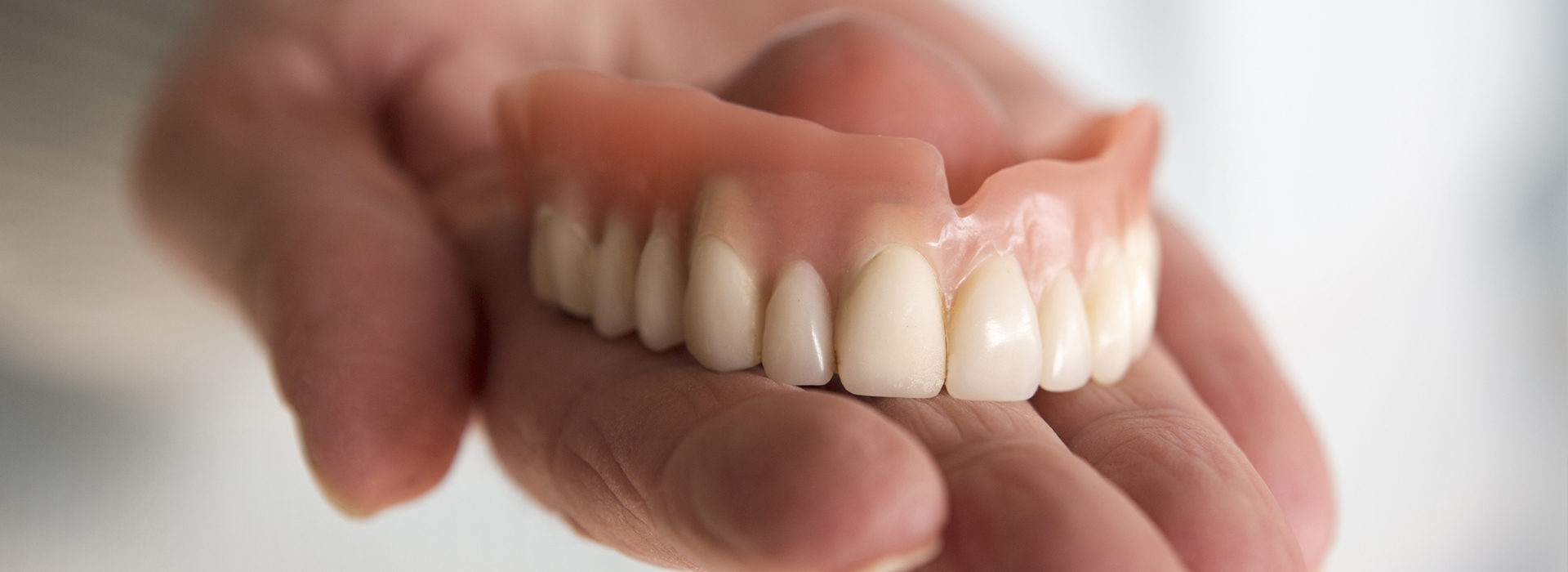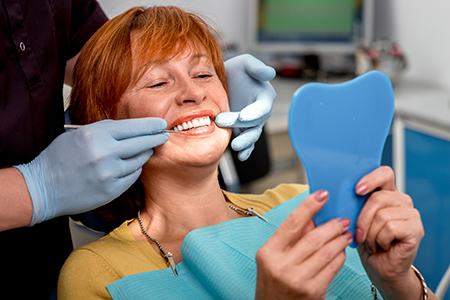
Our Office
8-10 Saddle River Road
Fair Lawn, NJ 07410
Existing Patients: (201) 797-8711
New Patients: (201) 479-0901
Visit Us Online

Advances in dental materials and laboratory techniques have made replacing missing teeth more natural and predictable than ever. While fixed options such as implants and bridges are excellent solutions for many people, removable dentures remain a reliable and versatile method to restore a complete smile and everyday function.
At Stahl Dental Studio, we design dentures using modern materials and careful craftsmanship to achieve comfortable fit, balanced function, and a pleasing appearance. Our approach blends clinical precision with aesthetic considerations so patients can speak, chew, and smile confidently.
Every treatment begins with a clear understanding of your goals, oral health, and daily routines. From selecting the right denture style to planning follow-up care, we focus on individualized solutions that fit your needs and lifestyle.
Tooth loss affects more than just your smile’s appearance. Missing teeth change how your bite functions, how your face is supported, and how easily you can enjoy a varied diet. Over time, gaps left by lost teeth allow remaining teeth to shift, which can lead to bite problems, uneven wear, and increased risk for future dental issues.
Beyond physical changes, missing teeth can influence social interactions and self-image. People often report avoiding certain foods, speaking less freely, or smiling with restraint. Restoring a complete set of teeth helps rebuild oral function and can also improve comfort and self-assurance in everyday life.
Addressing tooth loss earlier rather than later preserves surrounding structures and simplifies care. Whether a patient needs to replace a single tooth, multiple teeth, or a full arch, removable dentures provide a practical path to renewed function while preserving remaining oral health when designed and fitted correctly.

Removable dentures are prosthetic devices that rest on the gums and recreate the appearance and function of natural teeth. They consist of artificial teeth set in a supportive base that mimics gum tissue. Modern denture bases and teeth are made from durable, lifelike materials engineered for comfort and natural appearance.
Unlike fixed restorations, removable dentures can be taken out for cleaning and overnight rest, which makes it easier to maintain oral hygiene for both the appliance and the underlying tissues. This removability also allows for adjustments and relines as tissues change over time, helping the denture remain functional and comfortable.
Successful denture care begins with an accurate fit. Careful impressions, bite records, and try-ins are part of the process to ensure the denture aligns with your jaw and facial contours. Attention to these details reduces sore spots, improves speech, and helps the prosthesis work harmoniously with your oral muscles and saliva flow.
There is no single denture solution that fits everyone. Choice of design depends on how many natural teeth remain, the condition of those teeth and supporting bone, and your expectations for stability and function. Our team evaluates these factors thoroughly to recommend the most appropriate option for each patient.
Partial dentures replace a few missing teeth and usually rely on remaining natural teeth for retention and support. They help stabilize the bite and prevent adjacent teeth from drifting into empty spaces. Partial designs can vary in framework material—from traditional cast metal to flexible acrylics—each offering different advantages in strength, comfort, and aesthetics.
Full or complete dentures restore an entire arch when most or all natural teeth are missing. These prostheses distribute biting forces across the gums and underlying bone and are crafted to recreate lip and cheek support for a natural facial profile. When additional stability is desired, modifications such as attachments or implant support can enhance retention and confidence during function.
Conventional complete dentures are made after the gums and bone have healed following extractions. This approach often yields a precise fit once healing is complete, though it requires a temporary period without natural teeth while tissues recover.
Immediate Dentures
Immediate dentures are fabricated in advance and placed at the time teeth are removed so the patient does not go without teeth during healing. Because tissues change as they heal, these dentures often require follow-up adjustments or eventual conversion to a conventional denture for optimal long-term fit.
Overdentures
An overdenture gains extra stability by fitting over retained natural tooth roots or specialized attachments. Preserving selected teeth beneath an overdenture can maintain bone levels and provide improved support compared with a conventional complete denture.
Implant-supported Dentures
Implant-supported dentures attach to dental implants placed in the jaw and offer enhanced retention and chewing efficiency. This option can be especially helpful for lower jaws, where conventional dentures are often less stable.
Partial dentures replace one or several missing teeth and are anchored to adjacent natural teeth using clasps or precision attachments. They not only restore chewing ability and aesthetics but also help preserve the position of remaining teeth, preventing them from tilting or drifting into gaps.
Materials for partial frameworks range from strong, thin cast metal to tooth-colored flexible resins. Each material choice is selected based on the patient’s comfort, the location of missing teeth, and how the restoration will integrate with the existing dentition.

Creating a successful denture begins with a comprehensive evaluation. We review medical and dental history, examine the mouth and supporting structures, and use diagnostic tools to guide treatment planning. This ensures we address any infections, unstable teeth, or tissue issues before prosthesis fabrication.
The design process includes impressions, bite registrations, and aesthetic planning—selecting tooth shape, color, and arrangement to complement your face and smile. Try-ins allow you and the doctor to review fit and appearance before final processing so adjustments can be made early in the process.
When additional procedures are needed—such as extractions, tissue sculpting, or implant placement—we coordinate the sequence of care to promote predictable outcomes. Close attention to occlusion (bite), vertical dimension, and muscular dynamics helps prevent sore spots and keeps your denture comfortable during daily use.
After delivery, we schedule follow-up visits to refine fit and function. Denture maintenance, periodic relines, and routine oral exams help extend the useful life of the prosthesis and protect the health of the underlying tissues and any remaining teeth.

Adjustment to a new denture is normal and expected. In the days and weeks following delivery you may notice increased salivary flow, slight changes in speech, or sensitivity in areas where the denture contacts the gums. These reactions typically diminish as your mouth adapts and as small adjustments are made when needed.
Speaking and eating with dentures improves with practice. Begin with softer foods cut into small pieces, chew slowly and use both sides of the mouth evenly, and reintroduce firmer foods gradually. Reading aloud or practicing common phrases can speed speech adaptation.
Daily hygiene is essential for both the prosthesis and your tissues. Rinse and brush your dentures after meals, soak them nightly as recommended, and care for any remaining natural teeth and gums with regular brushing and gentle cleaning. Removing dentures at bedtime gives tissues a restorative break and reduces the risk of irritation.
Over time, the bone and soft tissues beneath a denture can change. Periodic relines or adjustments help maintain a secure fit and prevent pressure points. For patients seeking greater stability, options such as attachments or implant support can be discussed as long-term strategies to improve comfort and function.
At Stahl Dental Studio, our aim is to guide patients through each step—from planning to long-term maintenance—so dentures feel like a natural part of daily life. If you have questions about denture options, care, or what to expect, please contact us for more information.
Dentures are removable dental appliances that replace missing teeth and the surrounding tissues. They consist of artificial teeth set into a supportive base that rests on the gums and underlying bone. Dentures restore the ability to speak, chew, and smile while providing facial support that can improve overall appearance.
Unlike fixed restorations such as crowns or bridges, dentures can be taken out for cleaning and inspection of the oral tissues. Some dentures are designed to work with dental implants or remaining natural teeth to increase stability and retention. At Stahl Dental Studio we evaluate each case carefully to determine the best denture solution for a patient’s functional and aesthetic needs.
Indicators that dentures may be appropriate include multiple missing teeth, extensive decay or periodontal disease that makes saving teeth impractical, difficulty chewing or speaking, and noticeable changes in facial support. A thorough clinical exam, updated X-rays or CBCT imaging, and a review of medical history help determine candidacy for partial or complete dentures. We also consider the condition of any remaining teeth, the quality of the jawbone, and the patient’s goals for comfort and appearance.
Alternatives such as fixed bridges or implant-supported restorations may be discussed when they are clinically appropriate and desirable for increased stability. The treatment plan is individualized to balance oral health, function, and long-term prognosis. Your dentist will explain the pros and cons of each option and recommend the approach that best meets your needs.
There are two primary categories of removable dentures: full (complete) dentures and partial dentures. Full dentures replace all teeth in the upper or lower arch and are indicated when remaining teeth are missing or must be removed. Partial dentures are used when some natural teeth remain and they often use clasps or precision attachments to gain retention from adjacent teeth.
Full dentures can be fabricated as conventional full dentures placed after healing, or as immediate dentures inserted at the time of extractions to avoid a gap in appearance during healing. Overdentures are a type of full denture that gains additional stability from retained roots or attachments over implants. Partial denture frameworks can be made from cast metal, flexible resins, or hybrid materials depending on design and patient preference.
Implant-supported dentures attach to dental implants that are surgically placed in the jaw, providing improved stability and retention compared with conventional removable dentures. This attachment limits movement of the prosthesis during chewing and speaking and can substantially improve comfort and confidence for many patients. Implants also help transfer chewing forces to the jawbone, which can reduce progressive bone loss compared with traditional, tissue-supported dentures.
The planning process for implant-supported prosthetics involves additional diagnostic imaging and close coordination between surgical and restorative phases of care. Not every patient is a candidate for implants; factors such as bone volume, medical history, and overall health are evaluated. When implants are appropriate, they can be used to support both full-arch overdentures and fixed hybrid prostheses depending on the clinical goals.
Fabricating a denture is a multi-step process that usually includes an initial exam, precise impressions, bite registration, and multiple try-in appointments to verify fit, tooth position, and shade. Laboratory steps involve creating a customized base and arranging artificial teeth to harmonize with facial features and occlusion. Careful communication between the patient, dentist, and dental laboratory is essential to achieve an outcome that is both functional and natural-looking.
Once the denture is inserted, the clinician will check the bite and make any necessary adjustments to eliminate sore spots or pressure points. Patients are typically scheduled for follow-up visits to fine-tune fit and comfort as tissues settle or remodel. If remaining teeth require preparation or extraction prior to fabricating the prosthesis, those steps are coordinated to ensure an optimal long-term result.
An adjustment period is normal when receiving new dentures, and patients commonly experience changes in saliva production, minor soreness, and altered speech patterns for a short time. It can take several days to weeks to adapt fully to speaking clearly and chewing comfortably, and wearing the denture consistently helps speed the adaptation process. If sore spots develop, it is important to return to the dental office so adjustments can be made to relieve pressure.
Eating with dentures often begins with soft foods and gradual reintroduction of firmer textures while avoiding chewing on only one side. Practice and patience help restore efficient chewing patterns, and reading aloud or conversing frequently can accelerate speech adaptation. Regular follow-up appointments allow the clinician to monitor healing and make refinements that improve long-term comfort and function.
Daily denture care includes rinsing the appliance after meals, gently brushing it with a soft brush designed for dentures, and soaking it overnight in water or a recommended denture-cleaning solution. Avoid using abrasive household cleaners or hot water, which can warp or scratch the denture base. Cleaning the mouth is equally important: brush remaining natural teeth, gums, tongue, and the roof of the mouth to maintain tissue health and reduce the risk of infection or irritation.
Remove dentures at night to give oral tissues a rest and to reduce the risk of denture-related irritation or infections. Handle dentures carefully to avoid dropping them and inspect them regularly for signs of wear, cracks, or loose teeth. If you notice persistent odor, staining, or discomfort, contact the dental office for evaluation rather than attempting home repairs.
Dentures can restore facial support and help reestablish a natural profile that may have been altered by tooth loss, improving the overall appearance of the smile and lower face. While dentures replace the visible portion of the teeth and support soft tissues, conventional tissue-supported dentures do not stop the gradual bone remodeling that occurs after tooth loss. Over time, changes in jawbone shape can affect denture fit, which is why relines or adjustments are sometimes necessary.
Implant-supported solutions can mitigate some degree of bone loss by transmitting functional forces to the underlying bone and helping preserve bone volume. Regardless of denture type, routine dental examinations are important to monitor oral tissues and remaining teeth, detect any pathology early, and advise on preventive or restorative measures to support long-term oral health.
The useful life of a denture varies depending on materials, wear patterns, oral changes, and how well the appliance is cared for. While high-quality dentures are designed for durability, the shape of the jaw and gums can change over time, which may cause a once-comfortable denture to fit less securely. When fit becomes compromised, a reline can reshape the tissue surface of the denture to improve stability and comfort without replacing the entire appliance.
Replacement is considered when the denture shows excessive wear, fracture, persistent fit problems, or when changes in oral conditions require a new prosthesis for optimal function and aesthetics. Regular dental checkups allow your clinician to recommend relines, repairs, or replacement at the appropriate time to maintain comfort, oral health, and chewing efficiency.
Routine evaluations are an important part of long-term denture care and generally include checking the fit and condition of the prosthesis, assessing the health of remaining teeth, and performing an oral soft tissue exam. Many clinicians recommend follow-up visits at least once a year, with more frequent checkups during the initial adjustment period or when changes in fit or comfort occur. These visits also include screening for oral pathology and guidance on preventive care to support overall health.
If you have specific concerns about fit, sore spots, chewing difficulty, or changes in appearance, contact the dental practice in Fair Lawn for an earlier appointment. Regular professional oversight helps extend the functional life of dentures and ensures that any necessary relines, adjustments, or treatments are performed promptly and safely. At Stahl Dental Studio we prioritize careful follow-up to help patients maintain comfortable, healthy, and attractive dentures.
